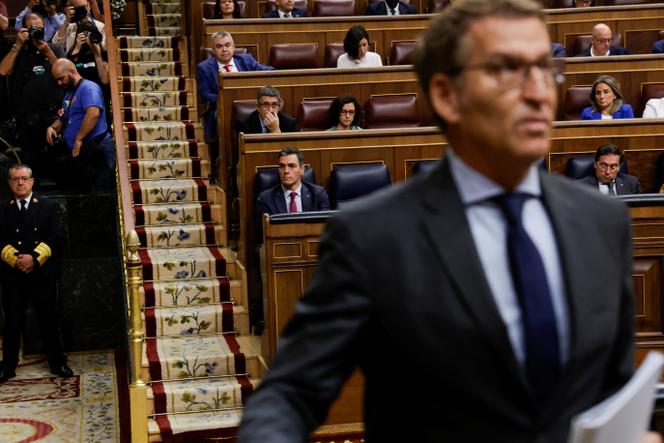


Unsurprisingly, even though he came out on top in the Spanish parliamentary elections on July 23, People's Party (PP, right) candidate Alberto Nuñez Feijoo failed to secure enough votes to head the next government. With 172 votes in favor – his party, the far-right Vox and a Canary Islands party – and 178 against – the left and regionalist parties – he lost the investiture vote at the Congress of Deputies on Wednesday, September 27. A second vote will take place on Friday, which should produce a similar result and pave the way for the candidacy of Socialist Pedro Sanchez.
Having come in second place in the July elections, the current head of government faces the complex task of winning over six different parties if he is to remain in power. While he is assured the votes of the radical left-wing Sumar movement, with which he intends to form a new left-wing coalition, they are not enough. He also needs to win the support of Basque, Galician and, above all, Catalan nationalists and pro-independence parties. These include those of the separatist Junts party, led by the former president of the Catalan government Carles Puigdemont, for whom the proposal of a "buffer zone" with the far right is not enough.
Speaking from Belgium, where he fled after the October 2017 secession vote attempt with the Spanish judiciary after him, Puigdemont has already set the conditions for possible support. First and foremost, he is demanding an amnesty law concerning all offenses linked to the calling of the illegal referendum on October 1, 2017, and the writing-off of the Catalonia region's debt, without ruling out self-determination.
Until the last elections, the position of the Spanish Socialist Workers' Party (PSOE) was always clear. "Amnesty is not compatible with the Constitution," Sanchez declared at the time. In recent days, however, he has opened the door to such a measure, telling journalists that it would be "consistent with the policy of normalization" he has pursued in Catalonia. Since taking over as head of government in Spain in 2018, Sanchez has prided himself on easing tensions in the former renegade region, where the Socialist Party is now the leading political force.
During the previous session, he granted pardons to nine pro-independence leaders convicted of sedition and approved a reform of the penal code abolishing the offense of sedition and lowering penalties for misappropriation of public funds. The aim was to satisfy the demands of the Republican Left of Catalonia (ERC), in order to win its support in parliament. However, July's results mean that Sanchez's PSOE must seek additional support alongside the ERC, considered more pragmatic and reliable than Junts, indispensable to the parliamentary equation it is seeking to resolve.
You have 48.27% of this article left to read. The rest is for subscribers only.
